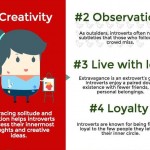The following is a guest post from introvert business coach, Pat Weber. Learn more about her in the author bio at the bottom of this post.
More people than ever are writing books and giving lectures about introverts. There is also street talk and academia research about how introverts make up a large population of the online social media trend.
Considering introverts and extroverts share space in our world both in person and online, what can online social media teach us about introverts?
Everyone can be heard.
It’s been said that social media levels the field for the introvert to be heard. More important than this might be that, while we all can be heard, our online life is almost a parallel universe to our face-to-face life.
What we look like online and how we appear face to face may be similar in that our motivations for connecting are the same. For example, those more extroverted can still be chatty and might use online communication more often when it suits their intentions. I have a few extroverted friends who actually dislike the online environment because they find it so – chatty! What they enjoy, however, is the quick and easy interaction.
While introverts may connect online to find solid relationships or deepen those with people they already know, most introverts I encounter have a specific focus for their online presence.
Whether we are more introverted or extroverted, we are all heard to the degree we want to be. Nottingham Trent University, and University of Texas at Austin, for example, have studies that show our voice online is similar to our voice in person.
It’s a level playing field online.
It’s the easy and controllable access that the introverts find strength in.
There are fewer, if any, introductions that leave us speechless after the “hello.” When we meet people face-to-face without being prepared, we might find steering the conversation energy draining.
Online, we’re much more adept at taking the conversation where we want to with ease, as Fernando Alsonso takes the Ferrari around a Grand Prix track. On the Internet, the “track” is accessible to all of us.
Early research of which personality type was online most speculated it was the more extroverted. But recent studies have concluded that more introverted and shy people are showing up there. If you think this through, it makes sense.
The more introverted, or shy (which do not necessarily go hand-in-hand), can find their social anxiety or even preference to be alone a negative factor with face-to-face situations. When we are in business or have family situations where relatives are gathered, there are certain expectations we have to live up to. Those much-revered social skills are sometimes under scrutiny.
And who among us wants to leave a networking event or family picnic with even the slightest doubt that people are talking well of us? No one I’ve ever met might have expressed, “I hope they are saying bad things about me.” We might not care, but we don’t hope for it.
Why does it matter what our temperament or personality type is online?
Online, each person, regardless if an introvert or extrovert, can be heard. If we decide we want to participate online and in the various social media sites, then we can be confident that we have a level playing field.
Until we find more leveling of the playing field in face-to-face situations, where expectations include – that we think before we speak, or that we listen more than talk, or that preparation is equally as effective as spontaneity – introverts have a place where we can still be the way we are and be recognized.
We can use online social media to learn that as individuals, while personality counts, we can each have our voice heard.
Patricia Weber supports and inspires introverts and baby boomers who want more energy and vitality to live life at full throttle.
She is an internationally recognized expert on radio and in print as a Business Coach for Introverts; Coachville graduate, a Neuro-Linguistic Programming (NLP) Certification and two-time award winner of Peninsula Women’s Networker of the Year (only the second member in its 30 years to receive this award twice.)
If you are fed up with the often uncomfortable extrovert rules, if you are tired of being tired, be ready to be inspired. Follow her blog at http://www.patricia-weber.com













can i get some more research aircle related to this